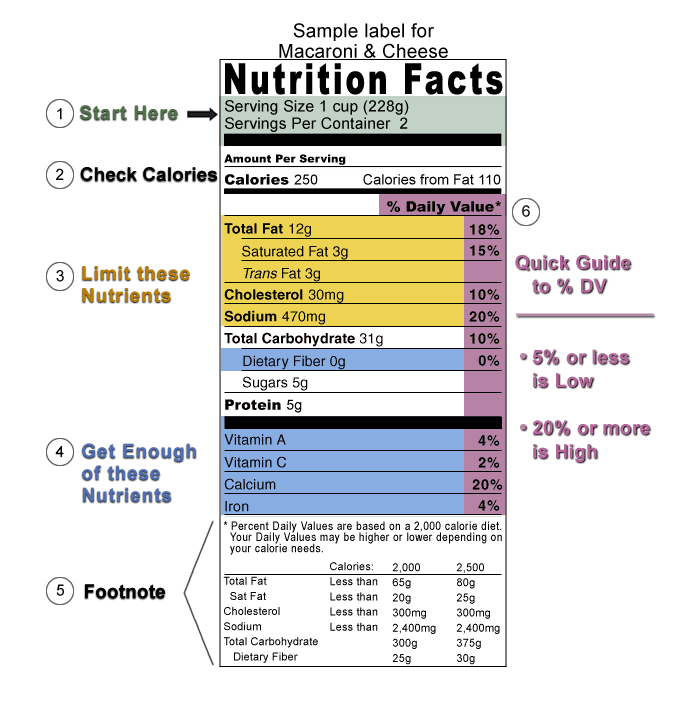6.1.3 Nutrition
Nutrients refers to the quality and quantity of vitamins, and minerals , proteins, carbohydrates, fats and water we take into our bodies for growth and maintenance.
It is important for health care professionals to understand the needs of the human body regarding nutrition—the biochemical and physiological process by which an organism uses food to support its life. Nutrition refers to the idea that different types of food contain differing levels of nutrients, which means that some food is more nourishing than others.
Luckily, we can usually access nutrition information either by reading nutrition facts labels that are displayed on packaged foods, or we can simply look up nutrition information for specific foods online. For example, review the following example of a nutrition facts label for packaged macaroni and cheese, along with the US Food and Drug Administration (FDA) instructions for what to do with this information:

So, we know that our bodies need nutrients, but how do we absorb nutrients, and then what do we do with the resulting energy? Whenever you speak about nutrition, you’ll likely find yourself talking about digestion and metabolism as well.
Digestion is not the same thing as metabolism. First, digestion must occur. Digestion refers to how the body processes food in the gastrointestinal (GI) tract and eliminates food waste via the intestines. During the digestive process, our body absorbs energy from the nutrients in the food. If you like, you can learn more about the digestive process by reviewing the information about it in 3.1.4 Healthy Body Processes.
Afterward, the metabolism kicks in. Metabolism is the internal process by which your body expends energy and burns calories. Learn more about how our metabolism works and the factors that can affect it by reading “The Truth about Metabolism” from Harvard Health.
You need to understand what our body is made up of, what the tissues in our body need to function and repair, and how the body uses this material to keep our body functioning smoothly. Access these Crash Course links to view the videos describing the nutrition needed by the body and how the metabolism works to convert nutrients in our food to energy:
- Metabolism & Nutrition, Part 1: Crash Course A&P #36
- Metabolism & Nutrition, Part 2: Crash Course A&P #37
Practice Makes Perfect
Did You Know?
What you are doing right now is thinking. You are thinking all day in one way or another, and your brain continues to work making sure your body functions even when at rest. So, your brain needs to function and be fueled 24 hours a day. The fuel is the food we eat. If you were a vehicle, you would require the best fuel for the vehicle to operate, your body is your vehicle, your brain is the motor and if your motor does not have the proper fuel, it will not function properly. In order to function properly your body and mind need the high-quality fuel which includes vitamins and minerals.
Canada’s Food Guide was developed to provide information relative to Canada regarding the nutrients needed from foods to maintain good health as well as to provide resources for menu ideas, portion amounts, food choice recommendations and specific dietary needs. The resources available through Canada’s Food Guide provide guidance for all age groups and populations, and even include recipes to make the most of the foods available in the different regions. Consider bookmarking the link to the food guide now, and refer to it often in your professional practice—and even in your own food choices.
Practice Makes Perfect
Check out the archive for the Dishing Up Nutrition podcast for specific interests pertaining to the connection between nutrition and health. Choose one or more episode(s) and take a listen.
Answer these questions:
- Which episode(s) did you choose?
- Why did you choose this/these episode(s)?
Did You Know?
Media Attributions
- Sample US Nutrition Label is licensed under a Public Domain license

